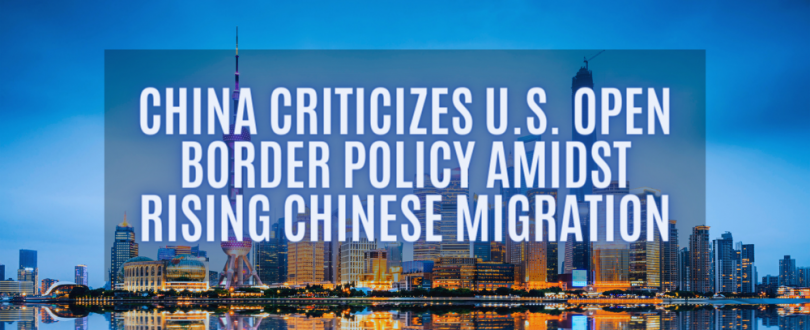
Amidst the complex dynamics of global politics, China’s vocal criticism of what it perceives as the U.S.’s lenient border policies stands in stark contrast to the increasing number of Chinese citizens migrating to the United States. This juxtaposition not only highlights the intricacies of international relations but also has significant implications for travelers and global observers keen on understanding the broader impacts on international mobility and migration trends.
China’s Official Stance on U.S. Immigration Policies
China has repeatedly expressed concerns over U.S. immigration policies, arguing that overly permissive border control could lead to instability and undermine both national and global security. These criticisms are often voiced in international forums, serving China’s broader diplomatic strategy of positioning itself as a counterbalance to Western ideologies. For travelers, comprehending this rhetoric is essential, as it shapes the geopolitical landscape they navigate when traveling between these two world powers.
Reasons Behind Increased Chinese Migration
Despite official criticisms, the United States remains a highly attractive destination for Chinese migrants, driven by a blend of economic, political, social, and educational factors:
- Economic Opportunities: The U.S. offers diverse and lucrative job opportunities that promise a higher standard of living.
- Political and Social Freedoms: The democratic governance and personal freedoms available in the U.S. starkly contrast with China’s more restrictive environment.
- Educational Excellence: American universities are renowned for their high-quality education and research opportunities, attracting students and academics worldwide.
Understanding these pull factors is crucial for travelers and potential migrants, as it sheds light on why many Chinese citizens choose the U.S. despite the official stance of their government.
The Reality of U.S. Immigration Policies
Contrary to the notion of ‘open borders,’ the U.S. employs a stringent immigration system characterized by rigorous vetting processes. This includes comprehensive background checks and strict criteria that applicants must meet. Recent policy adjustments have further tightened these measures, enhancing the system’s security and efficiency. Travelers, especially those considering long-term stays or migration, need to be well-informed about these procedures to navigate the system effectively.

The Impact on U.S.-China Relations
The discourse surrounding immigration is a significant factor in U.S.-China diplomatic relations, influencing trade negotiations, technology exchanges, and cultural interactions. The public and political narratives around immigration can exacerbate existing tensions, potentially impacting bilateral policies that govern travel regulations, visa processing, and overall diplomatic engagement between the two countries.
Comparative Analysis with Global Immigration Trends
Comparing the U.S.-China immigration issues with similar scenarios worldwide provides a broader perspective. For example, European countries have faced their migration crises, particularly concerning refugees from conflict zones. This comparison helps travelers understand how different nations address the balance between maintaining security and providing refuge.
Voices from the Ground
Personal accounts from Chinese immigrants in the U.S. add a human dimension to the immigration debate. Many describe America as a land of opportunities—a place where they can freely express themselves and pursue their ambitions, contrasting sharply with the constraints they experienced in China. These stories are invaluable for travelers as they bring to life the real-world consequences of immigration policies.
The ongoing debate over U.S. immigration policies and China’s critical stance offers a window into the complexities that define international relations today. As the world becomes increasingly interconnected, the policies and rhetoric of these superpowers will continue to influence global mobility, affecting everything from political landscapes to the practical realities of international travel and migration.
For those interested in the nuances of U.S.-China relations and global immigration trends, staying informed through credible sources is crucial. Engaging in community discussions and academic forums can also provide deeper insights and keep you updated on significant changes that may affect international travel or migration plans.

